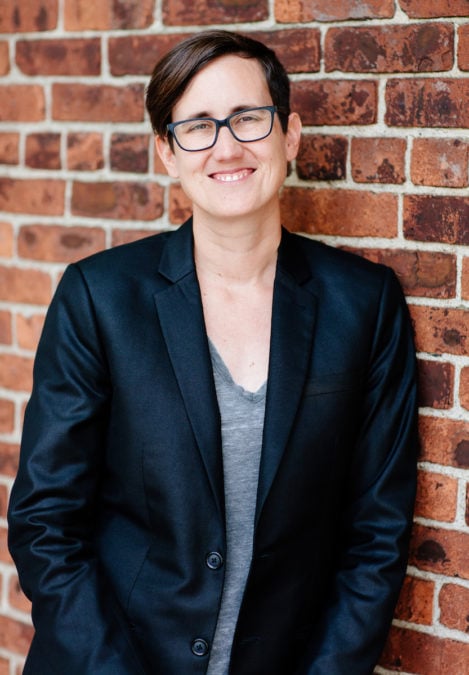What started as a small gathering to celebrate a lesbian TV character has grown into the world’s largest multi-fandom for LGBTQ women.
The third annual ClexaCon will take place in Las Vegas from April 11 to 15.
ClexaCon advocates for more queer female representation in front of and behind the camera in the entertainment industry.
“We want to push the conversation about representation in media forward and encourage more members of the LGBTQ community to become content creators and decision makers in the industry,” says Danielle Jablonski, one of the co-executive directors.
“We want members of our community to know that there is support out there for them to create the content they want to see and an audience who wants to see and support that content,” she says. “We want people to be inspired.”
ClexaCon will include a film festival, lots of workshops and panels, guest speakers, meet and greets, cosplay events, networking opportunities.
Katie Hill elected first LGBTQ Congresswoman from California
In November, organizers launched a pop-up version in London.
In an interview with Q Voice News, Jablonski talks ClexaCon’s beginnings, the importance of supporting independent filmmakers, and what’s new at ClexaCon.
Here are some excerpts.
ClexaCon beginnings
“The 2016-2017 TV season was a particularly bad one for LGBTQ women’s representation with a very high percentage of all female-identified LGBTQ characters being killed on their respective shows,” Jablonski says. “We were impacted by the death of fan-favorite Lexa from the show ‘The 100’ and the subsequent outpouring of frustration from LGBTQ women that our stories were not being represented well on our screens.”
A space for LGBTQ women
“We wanted to create an event to celebrate the stories we love and bring together fans and creators from around the world and to create a space in real life for some of the conversations that were happening on social media,” Jablonski says.
“We wanted to create a space where LGBTQ women and trans and non-binary people could feel at home.”

“We want to push the conversation about representation in media forward and encourage more members of the LGBTQ community to become content creators and decision makers in the industry,” says Danielle Jablonski, one of ClexaCon’s co-executive directors.
What’s new at ClexaCon
The Creator Lab and The Academic Lab will take place April 11 with a full day of panels, workshops, and networking events that focus specifically on helping creators and academics.
“The Creator Lab will allow creators to learn from some amazing industry professionals and organizations like SAG-AFTRA as well as networking with film festival coordinators and many others,” Jablonski says.
“The Academic Lab, in conjunction with the The University of Nevada Las Vegas Interdisciplinary, Gender, and Ethnic Studies Department, will have teaching and research sessions for anyone in or interested in academia to discuss integrating queer fandom and research into classrooms.”
‘Vida’ season 2, actor Ser Anzoategui wants these storylines
ClexaCon panels
ClexaCon will have more than 100 panels. Their largest lineup yet. Here are a few.
- “A How To Guide: Protecting Your Podcast, Blog or Web Series”
- “Making Your First Short Film”
- “Not all Queers Wear Capes: The Evolution of Queer Women in Mainstream Comics”
- “Queer Women and Trans People in Theatre”
- “Decolonizing Queer Spaces”
ClexaCon workshops
A ton of workshops also are scheduled, including “Disrupting for Change: Building Inclusive Communities” and “Dumbledore’s Army Is Still Recruiting: How to Use Fandom for Activism”
“My favorite workshop is our ‘Pitch to Production,’” Jablonski says. “Participants at this workshop will receive some helpful pitching tips before the workshop. Aspiring writers, chosen at random, will have 3 ½ minutes to pitch their ideas to professional writers, creators, and producers on the panel.
“It’s a fun and interactive workshop geared toward helping writers get their ideas out of their heads and into a successful pitch,” she says. “Having a good idea is one thing, but getting it sold, developed, shot, picked up and on the air is like winning the lottery. And it all starts with the pitch.”
Finalists will move on to part two and a chance to win a production deal with Tello Films, referred to as “the lesbian Netflix.”
Desert of LGBTQ women’s stories
“Part of getting more stories and more authentic stories on screen is having people in positions of power who care about and value those stories,” Jablonski says. “We believe that we need more LGBTQ women in those roles and more allies in the media helping LGBTQ women get to those roles. When the ultimate decision makers are not representative of our communities, it will be an uphill battle to get our stories told on screen.
“There are a lot of biases out there about women and more specifically about queer women,” Jablonski says. “Women do spend money and queer women will show up and invest their time, energy and love into something they care about.”
Support indie filmmakers
“We need more diversity in all aspects of content creation, including within mainstream media,” Jablonski says. “But in the meantime, we need to support more indie filmmakers. One way to do that is through crowdfunding the projects you value and want to see more of.”
